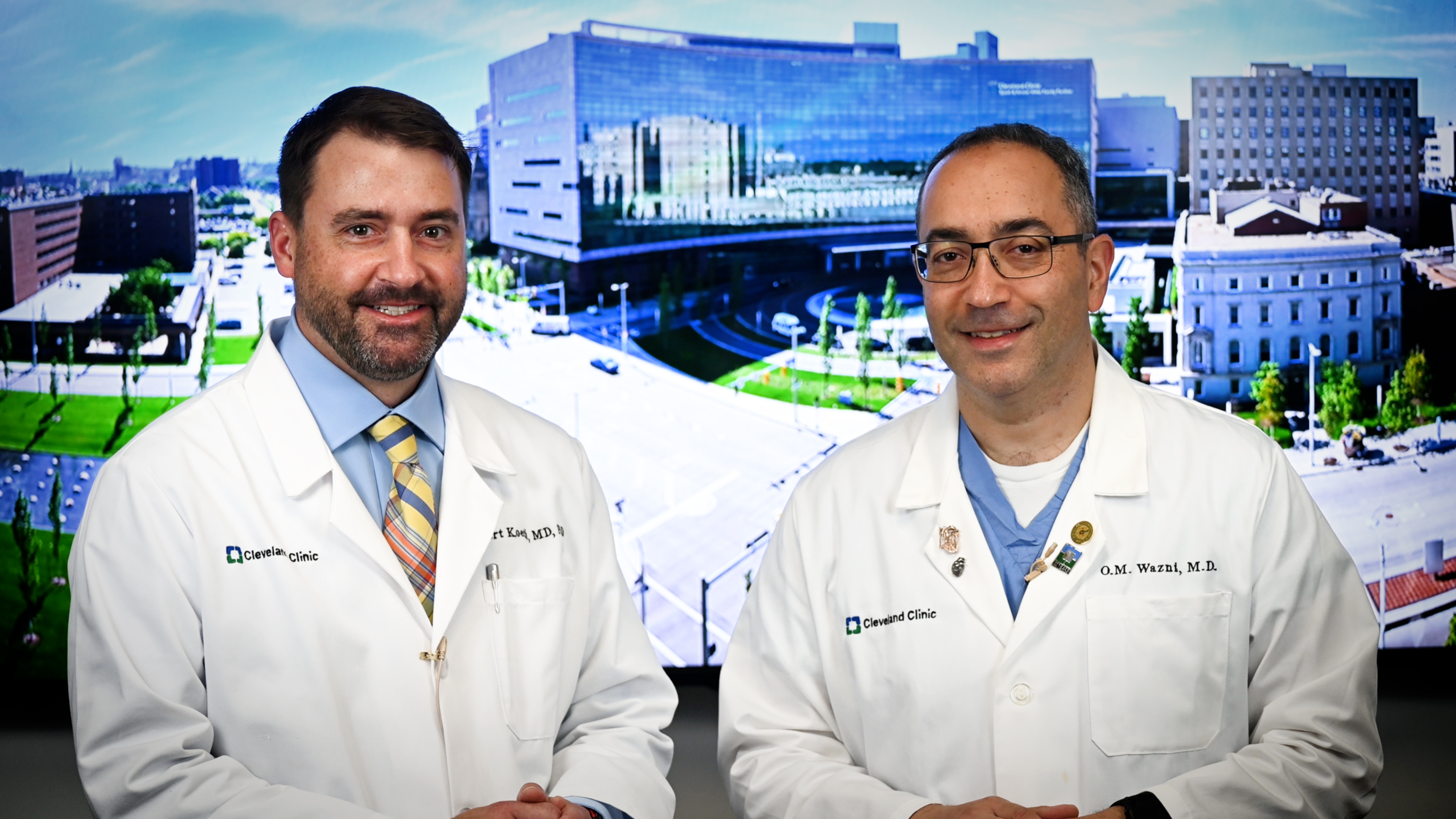Can Atrial Fibrillation Be Prevented?

September was Atrial Fibrillation Awareness Month. Drs. Oussama Wazni and Robert Koeth talk about if and how afib can be prevented.
Visit the Atrial Fibrillation Center at Cleveland Clinic
Learn more about Atrial Fibrillation and Stroke Prevention
Subscribe: Apple Podcasts | Buzzsprout | Spotify
Can Atrial Fibrillation Be Prevented?
Podcast Transcript
Announcer:
Welcome to Love Your Heart, brought to you by Cleveland Clinic's Sydell and Arnold Miller Family Heart, Vascular and Thoracic Institute. These podcasts will help you learn more about your heart, thoracic, and vascular systems, ways to stay healthy, and information about diseases and treatment options. Enjoy.
Oussama Wazni, MD:
Hello everyone and welcome again to another podcast from Clinical Electrophysiology here at the Cleveland Clinic. I'm Oussama Wazni. I'm the section head, and today with me is Dr. Robert Koeth, and we're going to talk to you about atrial fibrillation. Just as a reminder, [September was] atrial fibrillation month, and I encourage everybody to manage their atrial fibrillation if they know they have it. If they have palpitations, they should check for it. So, Bob, welcome and thank you for joining me today.
Robert Koeth, MD, PhD:
Thank you, Dr. Wazni.
Oussama Wazni, MD:
So, as you know, atrial fibrillation is a very common arrhythmia. The biggest issue with atrial fibrillation is stroke prevention, and after that, heart failure prevention, and also symptom relief. But are there things that patients should take care of or manage to decrease the risk of atrial fibrillation?
Robert Koeth, MD, PhD:
Yeah, so atrial fibrillation, we believe, is for the most part an acquired problem based on risk factors that we acquire during life. Probably one of the biggest ones is obesity, where we believe that probably about 20 percent of cases can be accounted for obesity alone. But there are others too. Heart failure, hypertension, or high blood pressure, as well as sleep apnea can all contribute to the pathogenesis of atrial fibrillation.
Oussama Wazni, MD:
So basically, Bob, if somebody is overweight, then they should maintain a healthy weight. I think that's very important. If they snore at night or somebody tells them that they snore, they should be checked for sleep apnea, and that should be treated. Hypertension and diabetes have to be well managed. All of these will decrease the risk of atrial fibrillation and also the risk of stroke in the long term. So, Bob, you've been working on some important new risk factors. Could you tell us more about your research in that?
Robert Koeth, MD, PhD:
Sure. So, I divide my time between the clinic and bench where I treat patients at the bedside, and I also try to develop novel treatments for the future at the bench. I'm interested in a pathway that we had previously associated with the clogging of the arteries, or coronary artery disease, where lipid in our diet can be metabolized by the gut microbiome. What we understand this pathway can do is we believe it can actually promote atrial fibrillation. So, I'm investigating the mechanisms by which we think that might happen.
Oussama Wazni, MD:
So, what could our patients do to decrease these metabolites, things they can do right now? You're working on the pathway and you're working on hopefully finding an agent that can treat that issue. But what can our patients do right now to decrease that possibility?
Robert Koeth, MD, PhD:
Well, what we call the precursors are typically found in things that we associate with cardiovascular disease, so meats, cheeses, and dairy, these sort of things. So, I think it also comes back to having a healthy diet and healthy lifestyle, trying to eat high fiber diets and avoid the so-called Western diet, a diet high in fat.
Oussama Wazni, MD:
So, I'm very happy that you brought that up. I'm originally from Lebanon, so here we go for the Mediterranean diet. So, we should reduce basically meat, focus more on fruits and vegetables, and maybe fish.
Robert Koeth, MD, PhD:
That's right.
Oussama Wazni, MD:
That would decrease those metabolites that can induce atrial fibrillation and other cardiovascular problems.
Robert Koeth, MD, PhD:
Actually, even in olive oil, something we attribute to lower cardiovascular risks, there's a natural inhibitor of that pathway within olive oil. So again, it comes back to having a healthy diet.
Oussama Wazni, MD:
So, to wrap things up, September was atrial fibrillation month. Once more, the most important aspect of managing AFib is a reduction of stroke, but actually more important than that maybe is also reduction of AFib itself or prevention of atrial fibrillation itself. So, for that, I think very importantly what we discussed is a healthy diet, maintaining a healthy weight, decrease the risk of sleep apnea, and if it's present, please treat it.
Another thing I want to touch on here is that if somebody is having palpitations or they're not feeling well and they feel that they're out of sorts, they should be checked for atrial fibrillation, because depending on risk factors, that could put them at risk for having a stroke.
Thank you once more, Dr. Koeth, for being with me today. Thank you for your attention and we'll see you next time for another podcast from Clinical Electrophysiology here at the Cleveland Clinic. Thank you very much.
Announcer:
Thank you for listening. We hope you enjoyed the podcast. We welcome your comments and feedback. Please contact us at heartatccf.org. Like what you heard? Subscribe wherever you get your podcasts or listen at clevelandclinic.org/loveyourheartpodcast.

Love Your Heart
A Cleveland Clinic podcast to help you learn more about heart and vascular disease and conditions affecting your chest. We explore prevention, diagnostic tests, medical and surgical treatments, new innovations and more.


